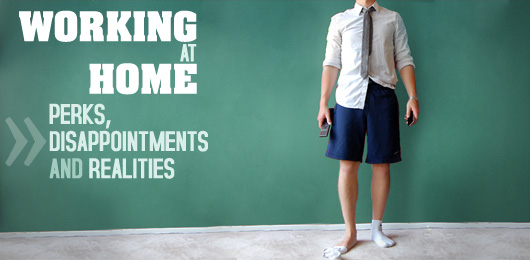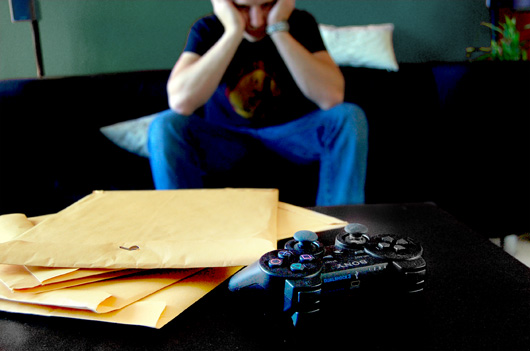I hate coming into the office. Ever since I saw that scene in Fight Club, where Edward Norton “negotiates” his new flexible work schedule, I’ve been weighing out the pros and cons of kicking my own ass and dragging myself by the wrists through broken glass in order to avoid the commute, the meetings and the awkward elevator chitchat. For Ed Norton’s character in the movie, it went a bit like this:
Boss: Get the fuck out of here, you're fired!
Narrator: I have a better solution. You keep me on the payroll as an outside consultant. And in exchange for my salary, my job will be never to tell people these things that I know. I don't even have to come into the office. I can do this job from home.
For me, though, it was a little bit less dramatic and bloody. My workplace itself is a satellite office of the main office in New York. Our office is essentially an eight car garage with broadband – we jack into the network and work independently, shooting off the occasional e-mail to deliver a report or ask a question. Because all of our documents and interactions are in the cloud, it makes sense to allow employees to telecommute every once in awhile.
As automobile traffic gets worse and binary traffic becomes better understood, more and more offices are adapting this model. Coders and IT professionals who may be more comfortable as a screen name than a suit and tie floating around the cubes are especially well-suited to being virtually present. Using programs like Skype, VNC, Google Docs and Basecamp, remote workers have come up with ways to simulate their presence with startling intuitiveness.
As you can see (and imagine), the technical logistics are a negligible roadblock to productivity at home. The real challenge is adapting to the dynamic of punching in from the comfort of your home and still, you know, getting some work done. In some ways, working at home isn’t all it’s cracked up to be. It has its ups and downs. Here’s what I mean:
You don’t always set your own hours.
In common parlance, the ol’ “9 to 5” is uttered with much resentment and spite. Seen as the twin shackles of The Man, this eight-hour lump represents the suffocating oppression of our time. To many, the draw of working at home or being self-employed is the prospect of “setting your own hours.” We are always thinking, “If I could just be more flexible with my time, I’d get so much more done!” But anyone who works on their own terms will quickly realize how symbolic the 9 to 5 really is.
A popular quip among consultants and freelancers is that they enjoy being able to set their work schedules – in fact, they can work any 80 hours a week that want. When you work on your own on a project-by-project basis, it’s no longer a matter of dutifully logging your 8 hours a day and then hightailing it to happy hour. You work to deadlines, and if that means working an occasional 16 hour day, then so be it. For example, I have a client who lives in Australia – because of the time difference, an email in my inbox that says “have this in by tomorrow morning” really means “have this done two hours ago.”
The irony of setting your own hours is that, the longer you do it, the more likely you are to fall into a rigid work structure anyway. We are creatures of habit, after all, and if you work smart, you’ll learn to take advantage of your most productive hours (for me, it’s the wee hours of the morning) and tackle menial tasks during the sleepy times (between 1PM and 3PM in my case). True, you won’t have to put in a PTO request every time you go to the dentist, but for the most part, you’ll likely work a pretty predictable schedule.
Good news: you’re your own boss. Bad news: you’re your own boss.
As Maria Bamford says in her self-employment bit: “I am really disappointed, when I work from home, with the general job performance of my primary employee.” Sure, you won’t have a Bill Lumbergh breathing down your neck every 15 minutes, but you’ll be charged with the far more difficult task of kicking your own ass into gear.
Without a WebSense filter and a roving boss, you’ll be far more tempted to stray towards Facebook or Google Reader throughout the day. It might feel nice to be able to waste time with administrative impunity, but really, you’re just shooting yourself in the foot.
The way I like to think of it is this: since you’re getting paid per contract, every second you keep your nose to the grindstone, you’re giving yourself a raise. If I can get a $100 project done in two hours, I’m paying myself $50 an hour. Pretty sweet. On the other hand, if I take an entire day to do it because I kept taking breaks to look at pictures of cats in sinks, I’m down to $12.50.
Being the boss of yourself is a double-edged sword. Getting the most out of your employee may take some creative management – if you’re not a “self starter,” then you’re company of one may be doomed to failure.
Or you could view it this way: instead of having just one boss, you now suddenly have dozens of bosses. They’re called clients. All they care about is getting the project done on time – they may not be as sympathetic as your old boss back at the office who had known you for years and understood your personal commitments might be.
Distractions
Offices are nice because they provide a pervasive environment of work-related stuff. It’s like a theme park of productivity. Everything – from the bulletin boards and posters to the interns and clients – is pertinent to work. At home, meanwhile, there are an infinite number of things that have nothing to do with the task at hand. Even small distractions can add up to big losses in productivity. Tim Ferris says that the average worker spends 40% of their time “task-switching” – that is, switching gears to focus on something else and then getting back into the groove with what you actually should be working on. So, even though it only takes 45 seconds to indulge your wife by watching “this big ol’ turkey just struttin’ around our backyard for no reason,” the time spent regaining your focus adds up to an exponentially greater loss at the end of the day.
You may have to take some drastic measures in order to block out the distractions of home, such as keeping a closed door policy for your home office, drawing the blinds on your windows and blocking your own Gmail account. In short, you may have to put yourself in a box as austere and closed-off as say, a cubicle.
Goodbye, sick days
It’s inevitable – there will be days when you catch a bug that just knocks you down for the count. You can’t drive a car, can’t keep food down, can’t even get out of bed. But hey, lucky for you, you won’t have to get out of bed to log on, since you’ve been working from home this whole time already. Plus, if you’re not salaried, there’s no such thing as a sick day anyway – there’s no paid time off and no one to cover you if you don’t suck it up and get the job done. Like I said before – you’ve got a lot of bosses to answer to. Some of them may have sympathy for your poor, achey-stuffy-sneezy body, but others may have too many problems of their own to listen to your excuses.
On the plus side, if there’s a lull in business and you're hale and hearty, you aren’t obligated to “look busy” in order to justify your hourly wage. When you’re on salary or a fixed rate, it can be hard to motivate yourself to put in extra effort, especially when there’s no extra reward. But if you’re working for yourself, you can chill out without feeling guilty once you’ve caught up on all your tasks. Or you can keep pushing and churn out bigger profits. With your effort more directly tied to your profits, taking time off when you need a break and burning the midnight oil when you’re inspired simply makes more sense.
R-e-s-p-e-c-t
This may not be an issue for you – but a lot of non-9-to-5ers find themselves in awkward positions when answering that staple of chitchat at parties: “So, what do you do?” Some people see independent consultants and freelancers as admirable risk-takers, self-starters and entrepreneurs. Others see them as lazy loafers who can’t handle a “real job.”
A lot of it has to do with how you present yourself, though. When asked “What do you do?” too many people actually answer the question “Who do you work for?” or “What’s your job title?” When you answer, “I work at home” or “Well, I’m kind of self-employed” you are being honest, but you are answering the wrong question. Tell them the truth: you configure databases for Fortune 500 companies; you design posters for non-profits; you coach executives on public speaking; you write humorous articles for national publications. If you spin it that way, being self-employed is actually liberating rather than shameful. After all, wouldn’t you rather be known for what you are passionate about, rather than who you call boss?
Allll by myseeelllff (there are bagels on the back table)
One of the saddest emails you can get when working remotely for a company: “Hey gang, in honor of Bob’s third year of service, I’ve picked up some jumbo bagels and coffee from Bagel-rama. Help yourself in the conference room.” Missing out on free grub can be a drag sometimes, but it’s more about the lack of camaraderie that goes hand-in-hand with being a reclusive worker. There is no water cooler, no midday interruptions for birthday cake, no inside jokes or dramatic interoffice romances.
Maybe this kind of silliness is exactly the kind of thing you were trying to escape when you severed ties with the cube farm. But as a human being, you need a little bit of face-to-face interaction now and then. Working at home in your fortress of solitude can get lonely sometimes – so much so that some independent consultants have taken to co-working. That is, paying money to work alongside other freelancers. Kind of like a together alone kind of thing. It seems kind of backwards to me, but I suppose it’s akin to getting a divorce and then seeking out some friends with benefits. Either way, the practice points to one truth: humans like being around humans.
All in all, there’s no telling what you’ll miss from office life and what you won’t. But the beauty of working at home and being your own boss is that you call the shots. If something is annoying, inefficient or unprofessional, you take the responsibility and the initiative to fix it. If you bag a big deal, impress a client or hit a homerun in the market, you get all the glory. As my friend and mentor said to me when I first made the transition: “It’s not easy. It’s not steady. And it’s not fun. But you wear no man’s collar.” For those who sleep better in a bed they’ve made themselves, working at home makes sense.












![Types of Jackets: An Encyclopedic Guide to Finding Your Perfect Style + How to Wear Them [28 Styles]](https://www.primermagazine.com/wp-content/uploads/2023/06/todd-snyder-dylan-jacket-review_feature.jpg)





